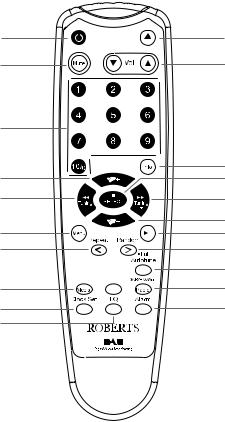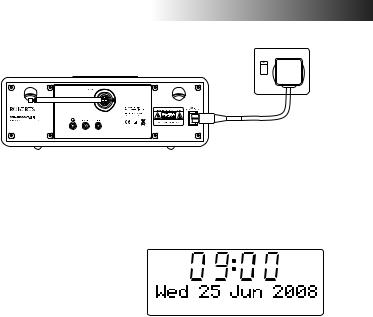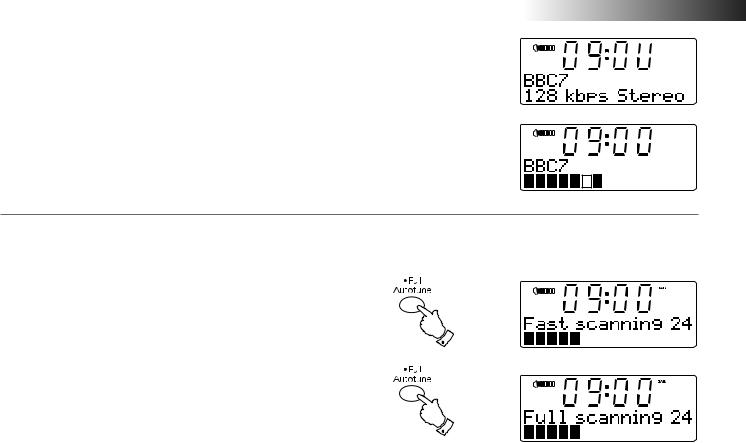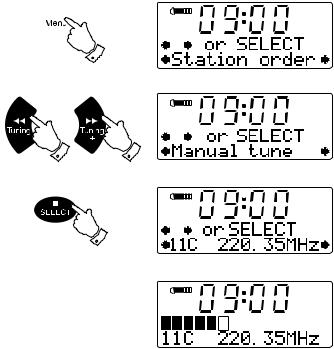Roberts Radio MP-43 User Manual

Sound for Generations
ROBERTS
CD/DAB/FM Digital Sound System with dock for iPod
Please read this manual before use
iPod is a trademark of Apple Inc., registered in the U.S. and other countries.
"Made for iPod" means that an electrical accessory has been designed to connect specifically to iPod and has been certified by the developer to meet Apple performance standards.
Apple is not responsible for the operation of the device or its compliance with safety and regulatory standards.
Contents |
|
About this instruction manual..................................................... |
2 |
Introduction................................................................................... |
3 |
MP-43 Sound System features .................................................. |
3 |
Controls and connections........................................................ |
4-5 |
Remote control........................................................................ |
6-7 |
Using the touch panel................................................................. |
8 |
Remote control functions............................................................ |
8 |
Display icons .............................................................................. |
8 |
Using the sound system for the first time ................................... |
9 |
DAB radio.................................................................................... |
10 |
Operating your sound system - DAB........................................ |
10 |
Selecting a station - DAB ......................................................... |
11 |
Secondary services - DAB ....................................................... |
11 |
Display modes - DAB .......................................................... |
12-13 |
Finding new stations - DAB...................................................... |
13 |
Manual tuning - DAB ................................................................ |
14 |
Station order setup - DAB ................................................... |
15-16 |
Software version - DAB............................................................ |
17 |
Dynamic range control - DAB................................................... |
18 |
FM radio....................................................................................... |
19 |
Operating your radio - search tuning FM.................................. |
19 |
Manual tuning - FM .................................................................. |
20 |
FM stereo / mono ..................................................................... |
20 |
Display modes - FM.................................................................. |
21 |
Presetting stations.................................................................... |
22 |
CD / MP3 / WMA.......................................................................... |
23 |
Compact discs.......................................................................... |
23 |
Playing a CD ....................................................................... |
24-25 |
CD search and repeat .............................................................. |
26 |
CD track programming ............................................................. |
27 |
MP3 / WMA CD mode .............................................................. |
28 |
MP3 / WMA file and folder selection.................................... |
29-30 |
iPod Docking............................................................................... |
31 |
Navigating your iPod ................................................................ |
32 |
Playing a file on your iPod................................................... |
32-33 |
Clock and Alarms ....................................................................... |
34 |
Alarms ................................................................................. |
34-35 |
Cancelling alarms..................................................................... |
36 |
Snooze ..................................................................................... |
36 |
Sleep function........................................................................... |
36 |
Setting the clock manually................................................... |
37-38 |
Standby brightness control....................................................... |
39 |
Audio and Setup......................................................................... |
40 |
Equaliser function..................................................................... |
40 |
Bass and treble settings...................................................... |
40-41 |
Mute function............................................................................ |
41 |
Auxiliary input socket................................................................ |
42 |
Line output socket .................................................................... |
42 |
Headphone socket ................................................................... |
43 |
Aerial removal........................................................................... |
43 |
Touch panel sensitivity control.................................................. |
44 |
System reset ............................................................................ |
45 |
Information.................................................................................. |
46 |
Cautions ................................................................................... |
46 |
Specifications ........................................................................... |
46 |
Mains supply ............................................................................ |
47 |
Guarantee ................................................................................ |
49 |
1

About this instruction manual
Thisinstructionmanualissplitintosectionsforeachofthedifferentoperating modes of your Roberts MP-43 Digital Sound System. The introduction describes the features and controls of the product.
There are six sections covering the main features in detail - DAB radio, FM radio, CD / MP3 / WMAplayback, iPod docking, Clock andAlarm, and Audio and Setup. Each section is clearly identified by the shaded heading in the top right hand corner of each pair of pages.
The two sections for DAB Radio and FM Radio describe how to use the sound system to listen to radio broadcasts.
The section for CD / MP3 / WMA player describes how to play digital audio CDs or MP3 / WMA files which have previously been recorded to
CD-R or CD-RW.
The section for iPod docking describes how to use your MP-43 to play audio files or video soundtracks directly from your iPod.
The section titled Clock and Alarms describes setting the clock, as well as explaining the use of the alarms, snooze and sleep timer features.
The Audio and Setup section describes how to use the audio equaliser and tone controls, how to connect other audio equipment, how to adjust the sensitivity of the touch panel and how to reset the sound system.
Lastly,the Informationsectionincludessafety,specificationsandwarranty information.
Introduction
DAB Radio
FM Radio
CD / MP3 / WMA
iPod Docking
Clock and Alarms
Audio and Setup
Information
(page 3)
(page 10)
(page 19)
(page 23)
(page 31)
(page 34)
(page 40)
(page 46)
2

MP-43 Sound System features |
Introduction |
The Roberts MP-43 Digital Sound System provides the following range of features in an attractive compact unit:-
●Radio for DAB and FM (with RDS) broadcasts.
●Audio CD player with track search and programming facility (can also play CD-R, CD-RW discs).
●Playback of MP3 and WMA files which have been recorded to CD-R or CD-RW.
●20 radio station presets (10 for DAB and 10 for FM).
●iPod docking connector to play your music collection or video soundtracks from your iPod.
●Easy to use, wipe clean, touch sensitive control panel.
●Clock display with time and date when in standby.
●Two alarm timers with snooze feature to wake you to either buzzer, radio, CD or iPod (with humane wake system on buzzer alarm).
●Adjustable sleep timer which can be set to turn the sound system off after between 15 and 120 minutes.
●Easy-to-read 2 line text display with large clock display.
●A 3.5mm stereo Auxiliary Input socket for playing audio from MP3 players, iPod devices which cannot use the dock connector, or other audio equipment.
●Astandard 3.5mm Line Output socket for connecting the audio signal to an external amplifier or recorder.
●A standard 3.5mm headphone socket for private listening.
●High quality, full range, stereo speakers (2 x 7W).
●An acoustically tuned, hand finished cabinet that includes bass ports and internal bracing for optimal sound reproduction.
●Low power consumption when in standby mode.
3

Controls and connections |
|
|
|
|
|
|
(Front) |
19 |
18 |
17 |
16 |
15 |
14 |
|
|
|
|
|
|
|
1 |
|
|
|
|
|
13 |
2 |
|
|
|
|
|
12 |
|
|
|
|
|
|
11 |
3 |
4 |
5 |
6 |
7 |
8 |
9 |
10 |
1. |
Infra-red sensor |
8. |
Equaliser button |
15. |
Tuning down / Rewind button |
2. |
On / Standby button |
9. |
Sleep / Clock set button |
16. |
Select / Stop button |
3. |
Radio button |
10. |
Alarm button |
17. |
Repeat button |
4. |
Volume Up and Down buttons |
11. |
Tuning Up / Fast-forward button |
18. |
Play / Pause button |
5. |
Media button |
12. |
CD eject button |
19. |
LCD display |
6. |
Info / Menu button |
13. |
CD in indicator |
|
|
7. |
Folder button |
14. |
CD slot |
|
|
4

Controls and connections |
Introduction |
20
(Rear)
|
|
24 |
21 |
22 |
23 |
20. |
Telescopic aerial |
23. |
Auxiliary input socket |
21. |
Headphone socket |
24. |
Mains input socket |
22. |
Line output socket |
|
|
5

Remote control
1.On / Standby button
2.Mute button
3.Key pad buttons 1-10/0
4.Folder Up button
5.Tuning Down / Rewind button
6.Menu button
7.Repeat button
8.Media button
9.Sleep / Clock set button
10.Equaliser button
11.Alarm button
12.Radio button
13.Auto-tune button
14.Random button
15.Play / Pause button
16.Folder down button
17.Tuning / Fast-forward button
18.Select / Stop button
19. Info button
20. Volume Up / Down buttons
21. CD eject button
Note:
The button marked Record is not used with the MP-43. It is intended for use with another Roberts product.
Button 8, marked CD/iPod/SD/USB, only provides access to CD and iPod functionality. The SD/USB markings are for another Roberts product.
1
2
3
4
5
6
7
8
9
10
CD/iPod/
SD/USB Record
21
20
19
18
17
16
15
14
13
12
11
6

Remote control battery replacement |
Introduction |
1.Remove the battery cover on the rear of your remote control by applying pressure to the catch in the direction shown by the arrow in the diagram, and then lifting the cover.
2.Insert 2 xAAAsize batteries into the compartment. Make sure the (+) and the (-) ends of the batteries are positioned as shown inside the compartment.
3.Close the battery cover by inserting the retaining lugs first, then apply pressure to the free end such that the catch latches the cover securely.
4.If the remote is not to be used for an extended period of time it is recommended that the batteries are removed.
2
IMPORTANT: The batteries should not be exposed to excessive heat suchassunshine,fireorthelike. Afteruse,disposablebatteriesshould if possible be taken to a suitable recycling centre. On no account should batteries be disposed of by incineration.
1. |
Battery compartment |
1 |
2. |
Latch |
|
3. |
Retaining lugs (inside) |
3 |
|
|
7

Using the touch panel |
Display icons |
TheMP-43soundsystemhasastylishtouchpanelinsteadofconventional buttons.
To operate the buttons simply touch the button area with the tip of a finger for about half a second.The clock set and system menu functions marked with a dot () are accessed by means of a long touch (2-3 seconds) on the appropriate button until the display on the sound system shows that the command has been accepted.
Youmayfindthatatfirst,thesoundsystemdoesnotalwaysdetectthatyou have touched a button. If so, try touching with a little more pressure, or for slightlylonger.Youwillsoonfindtheoptimumtouchneededtocontrolyour sound system. (See also Touch Panel Sensitivity Control on page 44.)
The panel may be cleaned using a dry cloth. Do not use abrasives, cleaning fluids or solvents.
Remote control functions
Most of the functions of the MP-43 sound system can be controlled using either the touch panel or the remote control. However, there are a few functions which are only accessible using the remote control. These are:
DAB / FM radio station presets |
DAB / FM auto-tune |
DAB menu function |
CD track access by numbers |
CD / iPod random track control |
Audio mute |
As with the front panel, some operations require a longer operation of the button (explained in the relevant sections). In this case simply keep your
finger held on the remote control button for 2-3 seconds until the display on the sound system shows that the command has been accepted.
D E F G H I
C |
J |
B |
K |
|
A |
P |
O N M L |
A. |
Sleep indicator |
I. |
CD indicator |
B. |
Alarm 1 and 2 indicators |
J. |
WMA indicator |
C. |
Snooze indicator |
K. |
MP3 indicator |
D. |
Speaker indicator |
L. |
Repeat all files indicator |
E. |
Clock digits |
M. |
Repeat folder indicator |
F. |
FM indicator |
N. |
Repeat single file indicator |
G. |
DAB indicator |
O. |
Aux input indicator |
H. |
Stereo indicator |
P. |
Two line text display |
8

Using the sound system for the first time
1.Place your sound system on a flat surface.
2.Fully extend the telescopic aerial. The aerial should be fully extended and positioned vertically for optimum reception.
3.Plug the mains lead into the mains socket located on the back of your sound system ensuring that the plug is pushed fully into the socket.
4.Plug the other end of the mains lead into the wall socket and switch on the wall socket.
IMPORTANT: The mains plug is used as the means of connecting the sound system to the mains supply. The mains socket used for the sound system must remain accessible during normal use. In order to disconnect the sound system from the mains completely, the mains plug should be removed from the mains socket outlet completely.
5.When your sound system is first switched on the clock display will show 12:00 and the unit will enter standby mode. It will then scan for DAB radio stations and when stations have been found the clock and date should be set automatically. Note that the display will not show any scanning message for this first scan.
6.Ifnostationshavebeenfoundthentheclockwillnotset.Youmayneed to relocate your sound system to a position giving better reception.
You should then carry out an auto-tune to find DAB stations. See DAB Operationonpage10andalsoFindingNewStationsonpage13.The clock will then be set from a DAB broadcast.
Introduction
9

Operating your sound system - DAB
1.Fully extend the telescopic aerial.
2.If your sound system is in standby mode, press the On / Standby button to switch it on.
3.PressandreleasetheRadio button toselectDABmode.Thedisplay will show "DAB" for a few seconds.
4.If this is the first time the sound system is used a quick scan of UK Band III DAB channels may be carried out (depending on whether scanning was already completed in standby mode). If the radio has been used before, the last used station will be selected.
5.When first switched on, the first station in the list of stations found will be played. The display will show the station name on the upper line of the text display and broadcast information on the lower line.
6.If the station list is still empty after the scan operation or if the selected station cannot be received your radio will display "Station not available".
7.If no signals are found it may be necessary to relocate your sound system to a position giving better reception, and then repeat the scan using the Auto-tune facility (see Finding New Stations on page 13).
Note that radio station name and frequency displays shown in this user guide may differ from those that you see on your radio. Broadcasters may change radio station names that are transmitted, and the frequencies used for DAB and FM radio stations may not be the same in all parts of the country.
DAB
2
DAB
3
DAB
DAB
10

Selecting a station - DAB
1.WhentheunitisinDABmodetheupperlineofthetextdisplaynormally shows the name of the station currently tuned.
2.Repeatedly press the Tuning Up or Down buttons to scroll through the list of available stations on the lower line of the text display. Stop pressing the Tuning buttons when you find the station that you wish to hear. If you keep pressing one of the tuning buttons then the unit will rapidly scroll through the list of available stations.
3.Press and release the Select button to cause the radio to tune to the chosen station. The display may show "Now tuning" while your radio
finds the new station.
The use of memory presets is described on page 22.
4.Adjust the Volume to the required setting.
If after selecting a station the display shows "Station not available" it may be necessary to relocate your radio to a position giving better reception.
2 |
2 |
 3
3
Secondary services - DAB
1. |
Certainradiostationshaveoneormoresecondaryservicesassociated |
|
|
with them. If a station has a secondary service associated with it the |
1 |
|
display will show ">>" next to the station name on the station list. The |
|
|
|
|
|
secondary service will then appear immediately after the primary |
|
|
service as you press the Tuning Up button. |
|
2. |
Press and release the Select button to select the station. |
2 |
|
|
DAB Radio
DAB
44
DAB
11

Display modes - DAB
When in DAB mode your radio has seven display options.
DAB
1. Press the Info button to cycle through the various modes. |
1 |
a. Scrolling text |
Displays scrolling text messages such |
|
as artist/track name, phone in number, |
|
etc. |
DAB
b. Programme type |
Displays the type of station being |
|
listened to e.g. Pop, Classic, News, etc. |
DAB
c. Multiplex Name |
Displays the name of the multiplex to |
|
which the current station belongs. |
 DAB
DAB
d. Time and date |
Displays the current time and date. |
 DAB
DAB
e. Channel & frequency Displays the channel number and frequency for the current DAB radio station.
12

Display modes - DAB cont.
f. Bit rate/audio type |
Displays the digital bit rate and audio |
|
type for the current DAB radio station. |
g. Signal strength |
Displays signal strength for the station |
|
being listened to. The clear rectangle |
|
shows the minimum required signal |
|
strength for clear DAB reception. |
Finding new stations - DAB
As time passes new stations may become available. To find new stations proceed as follows:-
1. With the unit in DAB mode (see page 10) press and release the |
1 |
Auto-tune button. The display will then show "Fast scanning". The radio will perform a scan of the UK DAB frequencies.As new stations are found the station counter on the right-hand side of the display will increase and stations will be added to the list.
2. To carry out a full scan of the entire DAB Band III frequencies press |
2 |
|
and hold the Auto-tune button for more than 2 seconds and then |
||
|
||
release. The display will show "Full scanning". As new stations are |
|
|
found the station counter on the right-hand side of the display will |
|
|
increase and stations will be added to the list. |
|
DAB Radio
 DAB
DAB
DAB
13

Manual Tuning - DAB
Manual tuning allows you to tune directly to the various DAB Band III channels. UK DAB stations are located in the range 11B to 12D.
1.PressandreleasetheMenu button sothatthedisplayshows"Station order".
2.Press the Tuning Up or Down buttons until "Manual tune" appears on the display. Press and release the Select button.
3.Press the Tuning Up or Down buttons to select the required DAB channel.
4.Press and release the Select button to select the channel. A signal strength display will appear. The clear rectangle shows the minimum required signal strength for clear DAB reception.
5.Any new stations that are found are automatically added to the stored list of stations.
6.Press and release the Select button to return to normal tuning mode.
 1
1
2,3 |
2,3 |
2,4,6
DAB
DAB
DAB
DAB
14
